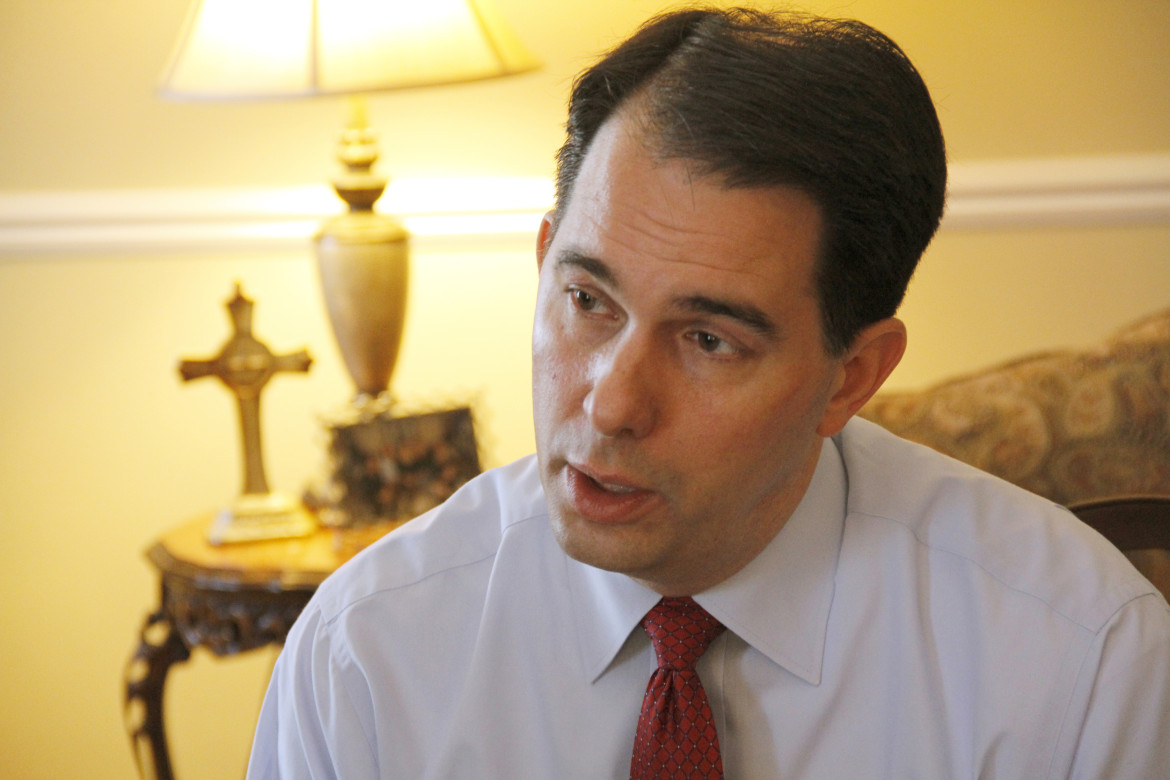Walker Has Access to Unlimited Donations
By not declaring for presidency he can grab unlimited donations to his "ideas" committee and a separate, super PAC.

Gov. Scott Walker at the executive residence, Dec. 30, 2014. Photo by Kate Golden/Wisconsin Center for Investigative Journalism.
Once upon a time in America, there were limits on how much people or groups could spend to influence an election. Now those limits are gone, as shown by the big-money apparatus forming to back Republican presidential aspirant Gov. Scott Walker.
In January, Walker launched a committee to spread his ideas and pay costs as he travels the country wooing potential voters and donors. The committee, Our American Revival, can raise and spend unlimited sums. At least two donors, including hedge fund billionaire Kenneth Griffin, have given Walker $100,000 or more, according to press accounts.
Had they so desired, these donors could have given $100 million. Walker’s committee can accept unlimited donations so long as he is neither a declared candidate nor “testing the waters” of a 2016 presidential bid. If and when that happens, individuals would be subject to a $2,700 cap.
It may surprise some that Walker, officially, is not testing the waters. From most vantage points, it looks like his socks are off, pant legs rolled up, and both feet submerged. He’s been hitting primary battleground states and marquee national events, and has even used the term “candidate” to refer to himself.
“We can call it a kind of legal fiction that Walker is not a candidate, even though he’s done lots of things that candidates do,” says campaign finance expert Ken Mayer, a professor of political science at the University of Wisconsin-Madison.
Mayer thinks Our American Revival will likely wind down once Walker announces. (OAR spokeswoman Kirsten Kukowski did not respond to a voice message or emailed questions.) Does that mean billionaires can no longer spend unlimited sums helping his cause? Ha! Good one!
Walker associates have already formed a new super PAC, or political action committee, which allows unlimited giving by individuals and corporations. It’s called Unintimidated PAC, after the title of Walker’s 2013 book, itself seen as a prelude to a presidential run.
Super PACs, unlike groups like OAR, can directly advocate for the election of a candidate. Some observers, like Rick Esenberg of the conservative Wisconsin Institute for Law & Liberty, see super PACs as preferable to “the problems caused by attempting to place limits on people’s ability to come together and exercise their freedom of association and freedom of speech.”
For one thing, super PACs must report where they get their money and how they spend it — though, as Mayer notes, “Often these organizations will give money to each other so it is more difficult to track.”
And super PACs must be “independent,” meaning they cannot coordinate messaging or strategy with the campaigns they support. But many super PACs springing up around 2016 presidential wannabes have deep ties to the candidates. Unintimidated PAC, for instance, was formed by two of Walker’s former campaign managers, Keith Gilkes and Stephan Thompson.
Walker could also get major help from other outside groups, like the political network created by billionaire industrialists Charles and David Koch that plans to spend $300 million on the 2016 elections. And he’ll need his own war chest.
A viable GOP candidate, it’s said, needs $75 million just to get through the first three primary states. Supporters of Democrat Hillary Clinton, who has expressed support for a constitutional amendment to curb campaign spending, are reportedly looking at total outlays of $2.5 billion.
“There is an arms race dynamic here,” Mayer says. He believes it will only get worse until “there is enough voter reaction that it begins to affect the political interest of the candidates.”
Wouldn’t you know it? Campaigns will keep sucking in more and more money until doing so comes at too great a cost.
Bill Lueders is the Money and Politics Project director at the Wisconsin Center for Investigative Journalism (www.WisconsinWatch.org). The Center produces the project in partnership with MapLight. The Center collaborates with Wisconsin Public Radio, Wisconsin Public Television, other news media and the UW-Madison School of Journalism and Mass Communication. All works created, published, posted or disseminated by the Center do not necessarily reflect the views or opinions of UW-Madison or any of its affiliates.
-
Wisconsin Lacks Clear System for Tracking Police Caught Lying
 May 9th, 2024 by Jacob Resneck
May 9th, 2024 by Jacob Resneck
-
Voters With Disabilities Demand Electronic Voting Option
 Apr 18th, 2024 by Alexander Shur
Apr 18th, 2024 by Alexander Shur
-
Few SNAP Recipients Reimbursed for Spoiled Food
 Apr 9th, 2024 by Addie Costello
Apr 9th, 2024 by Addie Costello




















